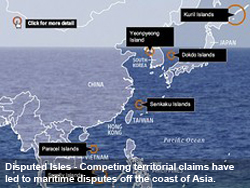
White House Says Senate Approval of Long-Stalled Treaty Would Let It Counter Beijing"s Claims in an International Forum
WASHINGTON—Defense Secretary Leon Panetta is beginning a new push for Senate approval of the Law of the Sea treaty, a long-stalled pact military officials believe is essential to preserve the Navy"s right to conduct exercises in waters near China and to enhance U.S. claims in the Arctic and elsewhere.
Conservatives have blocked ratification for years, arguing it gives too much power to international organizations over mineral rights, mainly oil. But with the Obama administration"s new emphasis on Asia and with China"s increasing aggressiveness, some officials believe ratification could at last be at hand.
The Law of the Sea Treaty sets out international rules for maritime navigation, territorial waters and countries" use of offshore areas as exclusive economic zones.
International negotiations on the treaty concluded in 1982, and it came into force 12 years later, but President Ronald Reagan opted not to submit the treaty for ratification, citing concerns about its mining provisions. The pact was later revised and every president since Bill Clinton has pushed for ratification.
Some White House officials believe a new push this year could be successful, although they say it may not be possible to get the Senate to vote on the treaty until the end of the year.
Oil companies eager to explore the Arctic for energy reserves are among business interests backing the push to ratify the treaty, arguing it would provide legal certainty for American corporations.
In a speech set for Wednesday sponsored by the Pew Charitable Trusts and the Atlantic Council—a nonprofit that promotes international relations—Mr. Panetta will argue that ratifying the treaty would help ensure the U.S. has freedom of navigation in the world"s oceans at a time when a new defense strategy acknowledges America"s return to its "maritime roots."
"The time has come for the United States to fully assert its role as a global leader, and accede to this important treaty," Mr. Panetta will say, according to a draft of his remarks reviewed by The Wall Street Journal.
China, which has ratified the treaty, has long argued that it can limit military activities within its exclusive economic zone, which extends 200 nautical miles from the shoreline.
The U.S. argues the treaty is clear that there is no restriction on military use of areas outside country"s territorial waters, which extend 12 nautical miles from shore.
U.S. defense officials say the best way to counter interpretations such as those given by China is to ratify the treaty and become a party to global talks.
"By moving off the sidelines and leading the discussion, we would be able to influence those treaty bodies that develop and interpret the Law of the Sea," Mr. Panetta will say. "In that way, we would ensure that our rights are not whittled away by the excessive claims and erroneous interpretations of others."
John Warner, a retired Republican senator who is helping organize the push for ratification, said if the U.S. ratified the treaty, it would be able to counter China"s view of the treaty over a negotiating table, rather than through a series of maritime confrontations.
"If we are not a member of the treaty, we are out there with gunboat diplomacy," said Mr. Warner, a senior adviser to Pew, a nonprofit organization focused on public-policy issues.
Sen. John Kerry (D., Mass.), the chairman of the Senate Foreign Relations Committee, is considering holding hearings on the treaty, said Jodi Seth, a spokeswoman for the senator. Ms. Seth said that the treaty is supported by "conservative-minded businesses" and Republican national-security experts.
"The unlikely allies who support the treaty make a powerfully persuasive case," Ms. Seth said.
Conservatives have blocked ratification of the treaty for well over a decade. Some conservatives argue that it would inevitably allow an international body to send oil and gas royalties from wells on America"s continental shelf to other nations.
Steven Groves, a scholar at the Heritage Foundation, a conservative think tank, argues the push for ratification makes little sense and that China"s view of the treaty is an outlier.
"What would the U.S. joining the treaty have anything to do with China changing its position?" Mr. Groves asked. "The thought that the U.S. entering the treaty will change the behavior of these bad actors … is complete silliness."
By Julian E. Barnes – Source: The Wall Street Journal

3.jpg)




















